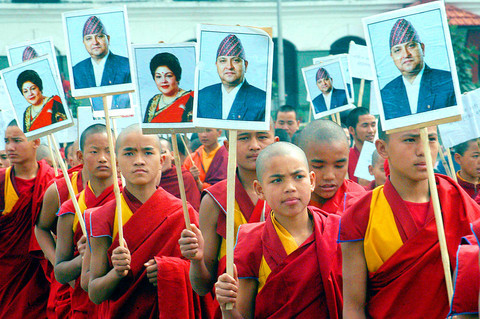Nepal's financial planners are scrambling as foreign donors disgusted by King Gyanendra's power grab last month cut off aid -- a vital lifeline for the impoverished Himalayan kingdom.
About 70 percent of the development budget is dependent on foreign aid, an official from Nepal's National Planning Commission said on condition of anonymity, warning that without it, "there will be no new bridges, roads, drinking water projects, schools or hospitals."
Making matters worse, the country's escalating communist insurgency has frightened off foreign tourists in recent years, depriving Nepal of one of its main sources of revenue.

PHOTO: EPA
The official said the government could make up for some of the losses out of reserve funds, but if the situation continues, the economy could plunge.
Gyanendra, a constitutional monarch, seized power on Feb. 1, imposed emergency rule and suspended civil liberties. He said he had to act because of the communist insurgency that has taken over much of the mountainous countryside.
Foreign governments, however, strongly voiced their dismay over the monarch's actions, with some recalling their ambassadors.
The UN children's agency said the crisis has blocked supplies of vital vaccines and medicines to some 3.3 million children, threatening their health. UNICEF executive director Carol Bellamy on Friday urged the government and the communist rebels to facilitate nationwide distribution of Vitamin A capsules and deworming drugs.
"It is vital that these supplies reach remote areas as soon as possible," Bellamy said. "Both sides need to put the health of Nepal's children first."
In Kathmandu, officials are still calculating the total aid that has been lost due to the crisis.
For this fiscal year, which ends in July, foreign aid makes up 32 billion rupees (US$450 million) of the 42 billion rupee (US$590 million) budget allocated for development projects. The total annual budget is 110 billion rupees (US$1.55 billion).
So far, European nations like Switzerland, Denmark and Norway have already suspended contributions for development work.
Norway has withdrawn US$8 million in aid for a project to increase drinking water in Kathmandu. The capital has severe water shortages, and its population of 1.5 million gets its drinking water for two hours every other day.
The World Bank also suspended US$70 million in aid after the royal takeover, while the Asian Development Bank (ADB) is assessing the situation.
"ADB's ongoing operations will critically depend on how the security situation evolves," said Hafeez Rahman, the bank's resident representative for Nepal.
The diminishing aid isn't just hitting development. Two of Nepal's key allies, India and Britain, have suspended military aid, which it needs in its battle with the communist rebels.
The US is considering a similar move, but has been moving more cautiously, fearing it could indirectly help the rebels. It has given US$22 million in military aid over the past four years, and is considering another US$2 million in assistance.
Analysts say it would be difficult for Nepal without the generosity of donor nations.
"If the government thinks it can sustain the economy without foreign aid, it is nothing but a mad assumption," said Bishwombar Pyakurel, an independent economist.

Auschwitz survivor Eva Schloss, the stepsister of teenage diarist Anne Frank and a tireless educator about the horrors of the Holocaust, has died. She was 96. The Anne Frank Trust UK, of which Schloss was honorary president, said she died on Saturday in London, where she lived. Britain’s King Charles III said he was “privileged and proud” to have known Schloss, who cofounded the charitable trust to help young people challenge prejudice. “The horrors that she endured as a young woman are impossible to comprehend and yet she devoted the rest of her life to overcoming hatred and prejudice, promoting kindness, courage, understanding

US President Donald Trump on Friday said Washington was “locked and loaded” to respond if Iran killed protesters, prompting Tehran to warn that intervention would destabilize the region. Protesters and security forces on Thursday clashed in several Iranian cities, with six people reported killed, the first deaths since the unrest escalated. Shopkeepers in Tehran on Sunday last week went on strike over high prices and economic stagnation, actions that have since spread into a protest movement that has swept into other parts of the country. If Iran “violently kills peaceful protesters, which is their custom, the United States of America will come to

‘DISRESPECTFUL’: Katie Miller, the wife of Trump’s most influential adviser, drew ire by posting an image of Greenland in the colors of the US flag, captioning it ‘SOON’ US President Donald Trump on Sunday doubled down on his claim that Greenland should become part of the US, despite calls by the Danish prime minister to stop “threatening” the territory. Washington’s military intervention in Venezuela has reignited fears for Greenland, which Trump has repeatedly said he wants to annex, given its strategic location in the arctic. While aboard Air Force One en route to Washington, Trump reiterated the goal. “We need Greenland from the standpoint of national security, and Denmark is not going to be able to do it,” he said in response to a reporter’s question. “We’ll worry about Greenland in

PERILOUS JOURNEY: Over just a matter of days last month, about 1,600 Afghans who were at risk of perishing due to the cold weather were rescued in the mountains Habibullah set off from his home in western Afghanistan determined to find work in Iran, only for the 15-year-old to freeze to death while walking across the mountainous frontier. “He was forced to go, to bring food for the family,” his mother, Mah Jan, said at her mud home in Ghunjan village. “We have no food to eat, we have no clothes to wear. The house in which I live has no electricity, no water. I have no proper window, nothing to burn for heating,” she added, clutching a photograph of her son. Habibullah was one of at least 18 migrants who died